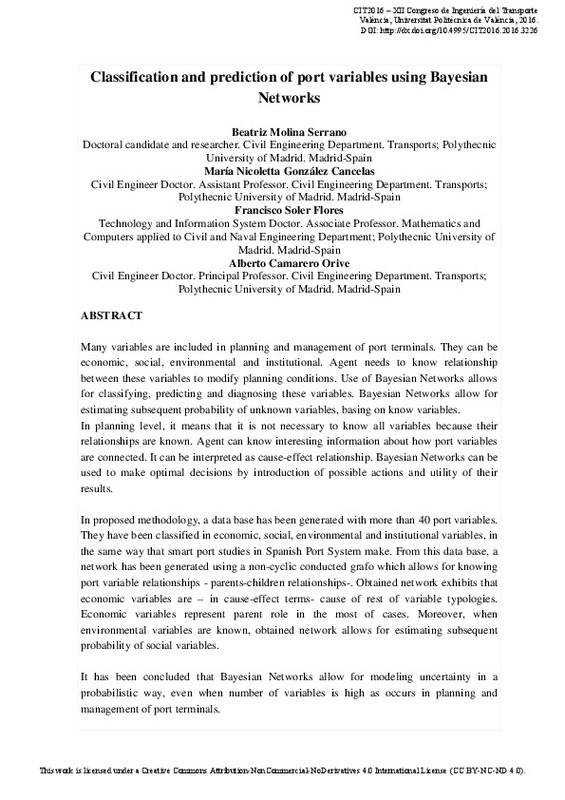JavaScript is disabled for your browser. Some features of this site may not work without it.
Buscar en RiuNet
Listar
Mi cuenta
Estadísticas
Ayuda RiuNet
Admin. UPV
CLASSIFICATION AND PREDICTION OF PORT VARIABLES
Mostrar el registro sencillo del ítem
Ficheros en el ítem
| dc.contributor.author | Molina Serrano, Beatriz
|
es_ES |
| dc.contributor.author | González Cancelas, María Nicoletta
|
es_ES |
| dc.contributor.author | Soler Flores, Francisco
|
es_ES |
| dc.contributor.author | Camarero Orive, Alberto
|
es_ES |
| dc.date.accessioned | 2017-11-10T10:42:04Z | |
| dc.date.available | 2017-11-10T10:42:04Z | |
| dc.date.issued | 2016-06-01 | |
| dc.identifier.isbn | 9788460899600 | |
| dc.identifier.uri | http://hdl.handle.net/10251/90834 | |
| dc.description.abstract | [EN] Many variables are included in planning and management of port terminals. They can be economic, social, environmental and institutional. Agent needs to know relationship between these variables to modify planning conditions. Use of Bayesian Networks allows for classifying, predicting and diagnosing these variables. Bayesian Networks allow for estimating subsequent probability of unknown variables, basing on know variables. In planning level, it means that it is not necessary to know all variables because their relationships are known. Agent can know interesting information about how port variables are connected. It can be interpreted as cause-effect relationship. Bayesian Networks can be used to make optimal decisions by introduction of possible actions and utility of their results. In proposed methodology, a data base has been generated with more than 40 port variables. They have been classified in economic, social, environmental and institutional variables, in the same way that smart port studies in Spanish Port System make. From this data base, a network has been generated using a non-cyclic conducted grafo which allows for knowing port variable relationships - parents-children relationships-. Obtained network exhibits that economic variables are – in cause-effect terms- cause of rest of variable typologies. Economic variables represent parent role in the most of cases. Moreover, when environmental variables are known, obtained network allows for estimating subsequent probability of social variables. It has been concluded that Bayesian Networks allow for modeling uncertainty in a probabilistic way, even when number of variables is high as occurs in planning and management of port terminals. | es_ES |
| dc.format.extent | 8 | es_ES |
| dc.language | Inglés | es_ES |
| dc.publisher | Editorial Universitat Politècnica de València | es_ES |
| dc.relation.ispartof | XII Congreso de ingeniería del transporte. 7, 8 y 9 de Junio, Valencia (España) | es_ES |
| dc.rights | Reconocimiento - No comercial - Sin obra derivada (by-nc-nd) | es_ES |
| dc.subject | Sustainability | es_ES |
| dc.subject | Ports | es_ES |
| dc.subject | Bayesian Networks | es_ES |
| dc.title | CLASSIFICATION AND PREDICTION OF PORT VARIABLES | es_ES |
| dc.type | Capítulo de libro | es_ES |
| dc.type | Comunicación en congreso | es_ES |
| dc.identifier.doi | 10.4995/CIT2016.2015.3226 | |
| dc.rights.accessRights | Abierto | es_ES |
| dc.description.bibliographicCitation | Molina Serrano, B.; González Cancelas, MN.; Soler Flores, F.; Camarero Orive, A. (2016). CLASSIFICATION AND PREDICTION OF PORT VARIABLES. En XII Congreso de ingeniería del transporte. 7, 8 y 9 de Junio, Valencia (España). Editorial Universitat Politècnica de València. 1437-1444. https://doi.org/10.4995/CIT2016.2015.3226 | es_ES |
| dc.description.accrualMethod | OCS | es_ES |
| dc.relation.conferencename | CIT2016. Congreso de Ingeniería del Transporte | es_ES |
| dc.relation.conferencedate | June 07-09,2016 | es_ES |
| dc.relation.conferenceplace | Valencia, Spain | es_ES |
| dc.relation.publisherversion | http://ocs.editorial.upv.es/index.php/CIT/CIT2016/paper/view/3226 | es_ES |
| dc.description.upvformatpinicio | 1437 | es_ES |
| dc.description.upvformatpfin | 1444 | es_ES |
| dc.type.version | info:eu-repo/semantics/publishedVersion | es_ES |
| dc.relation.pasarela | OCS\3226 | es_ES |








